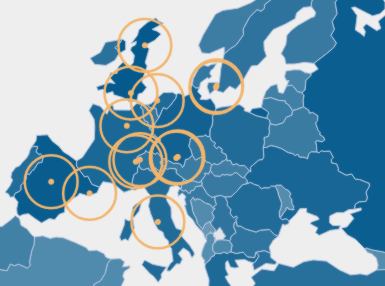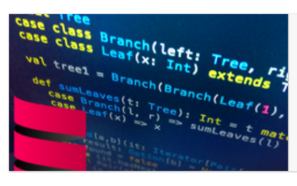| Computer Science MOOCs for March |
| Written by Sue Gee | |||
| Sunday, 03 March 2013 | |||
|
If you've not yet joined in a Massive Online Open Course there are always new opportunities to do so. Here's a round up of some of the Computer Science classes starting this month. Udacity has two courses debuting in March, and while you can enrol in any of its existing courses at any time there is added impetus to being part of the initial cohort that follows along as the lectures and assignments are presented for the first time. Both of this month's class starts come from industry experts: Functional Verification - How to Verify Chips and Eliminate Bugs will be taught by Axel Scherer and Hannes Fröhlich who are engineers at electronic design company, Cadence. This is an advanced level course and its prerequisites include object-oriented programming and knowledge of data and control structure. It is something of a cross over from software to hardware. It starts March 12 and has nine weeks of content culminating in an exam.
March 11 is the starting date for Udacity's new 3D Computuer Graphics, that will teach you about the basic principles of 3D computer graphics such as meshes, transforms, cameras, materials, lighting, and animation. It's tutor is Eric Haines, a Senior Principal Engineer at Autodesk, where he is working on a next-generation interactive rendering system for computer-aided design applications. This is considered an intermediate level course; some knowledge of JavaScript would be useful and also familiarity with vectors and matrices.
edX also has a computer graphics course, starting March 18 and taught by Ravi Ramamoorthi,a professor at UC Berkeley. Its title, Foundations of Computer Graphics (CS184.1x) suggests it might be at an introductory level. However its prerequisites state: Solid C/C++ programming background (Java is ok too; you will pick up C++). During the class, which lasts 6 weeks with a workload of 12 hours per week, students will make images of 3D scenes in real-time, and with offline raytracing.
Coursera's latest news is that a further 29 universities have partnered with it to provide free online courses. Thirteen of the new institutions are in the United States, two are in Mexico, ten are in Europe and four in Asia - in Taiwan, Hong Kong, Singapore and Japan. Courses from some of the international universities will be in Chinese, French, Spanish and Italian. This influx brings the total number of Coursera partners to 62 institutions. Their locations are marked on a visualization which also indicates where students come from - the deeper the shade of blue, the more students.
Coursera now offers some of its courses on its "Signature Track". These are classes where students' identity has been established and it students can earn a Verified Certificate for completing the course. In order to join Signature Track you need photo ID and also a webcam which is used to create an online biometric profile with your picture and unique typing pattern. As well as the certificate you can share course records with educational institutions, employers or anyone ese through a secure URL. This is a charged for service, and currently there are introductory prices, and only a small number of courses are included. Consult the Signature Track Guidebook for more details
One of them is Internet History, Technology and Security which started on March 1. Taught by Dr Chuck Severance this is a course that has no prerequisites and a relatively light workload of 3-5hours per week. Having completed this course at its first presentation I can recommend it to anyone who wants to understand the why and how of the history of the internet and its current operation. Ten other classes in Coursera's Computer Science curriculum are starting this month, some new and some re-runs. The links below access details, with videos. A 9-week course in Social Network Analysis starts March 4. It is taught by Lada Adamic an Associate Professor at the University of Michigan who spent a sabbatical year working at Facebook. The course will provide interactive demonstrations and tools for hands-on analysis of real-world data sets. Two other courses start on March 4: Pattern-Oriented Software Architectures for Concurrent and Networked Software in which Douglas C. Schmidt of Vanderbilt University sets out to show how to apply patterns, pattern languages, and frameworks to alleviate the complexity of developing concurrent and networked software. VLSI CAD: Logic to Layout in which Rob A. Rutenbar of University of Illinois at Urbana-Champaign looks at how to design complex chips with CAD software tools.
Computational Photography a 5-week course about the basics of how computation has impacted the entire workflow of photography, from how images are captured, manipulated and collaborated on and shared starts on March 25 and will be taught by Irfan Essa of the Georgia Institute of Technology. It requires college level math including linear algebra and some programming. Web Intelligence and Big Data is a 10-week course from Gautam Shroff of the Indian Institute of Technology, Delhi, that starts March 25. It is a graduate-level course that explores AI-based web intelligence applications, the AI/statistical techniques that make them possible, along with parallel implementations using map-reduce and related platforms. March 25 also sees the start of Functional Programming Principles in Scala, taught by the creator of Scala, Martin Odersky who is also a professor ar EPFL (École Polytechnique Fédérale de Lausanne). This course assumes prior programming knowledge and is hand-on. Its 7 weekly units introduce short programs that serve as illustrations of important concepts which students will modify and improve and assignments will mostly consist of programming projects.
Learn to Program: Crafting Quality Code, taught by Algorithms, Part II taught by Kevin Wayne and Robert Sedgewick starts again on March 18 and a re-run of Dan Boneh's Cryptography I begins March 25. I Programmer team members have enrolled on some of these courses and will report back with reviews at a later date. If you have any experiences of past, present or future MOOCs then we'd all love to hear about them. More InformationRelated ArticlesFree Online Computer Science Courses Starting February New Udacity Classes On Games, Graphics, Parallel & Chips Amazon Offers GPU Access to Udacity Students A Computer Science Degree from Udacity? Udacity Has More Computer Science Sebastian Thrun Resigns from Stanford to Launch Udacity Coursera Expands Partner Network Coursera Raises $16M and Plans Wide Range of Courses edX Expands and Announces New Courses
To be informed about new articles on I Programmer, install the I Programmer Toolbar, subscribe to the RSS feed, follow us on, Twitter, Facebook, Google+ or Linkedin, or sign up for our weekly newsletter.
Comments
or email your comment to: comments@i-programmer.info
|
|||
| Last Updated ( Sunday, 03 March 2013 ) |




